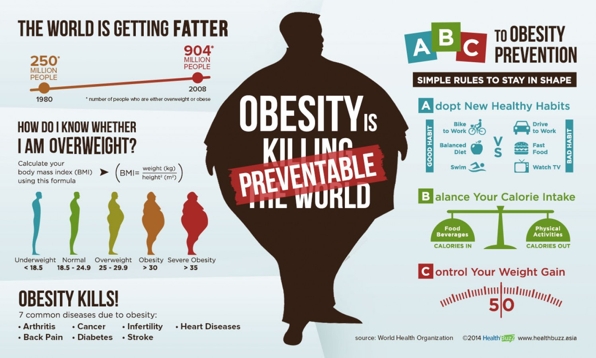Here at the Editor’s Desk of the FFB, we see story ideas about The War on Obesity every week. Sometimes whole flocks of them land at once. But not until now have researchers bothered to look into why we seem to be making so little headway against one of the most serious crises we face…
 More no-holds-barred public information efforts such as the World Health
More no-holds-barred public information efforts such as the World Health
Organization high-impact anti-obesity info poster above are just one
kind of measure that’s needed to get a constant flow of in-your-fat
-face anti-obesity facts out on the street. More-direct intervention
in the stores, communities and the environment are also needed…
I first want to point out that some of the most progressive-sounding anti-obesity programs I hear about come from the UK, where they have the sullen distinction of maintaining one of the highest child- and adult-obesity rates in the developed world. Study after study suggests what to do about the problem – which costs the UK’s health care system an estimated 27 billion pounds a year. Yet, year after year, decade after decade, the overall rates of obesity there fail to come down significantly.
Now a UK study aimed at finding out why this should be so has come up with some shocking results and makes some obvious conclusions…
What they did
A team from the University of Cambridge led by Dolly Theis and Martin White at the Centre for Diet and Activity Research (CEDAR) identified 14 government-led obesity strategies in England from 1992-2020. The team analysed these strategies – which contained 689 wide-ranging policies – to determine whether they have been fit-for-purpose in terms of their strategic focus, content, basis in theory and evidence, and implementation viability.
What they found
In an abstract of the study findings, Theiss summed up: “In almost 30 years, successive UK governments have proposed hundreds of wide-ranging policies to tackle obesity in England, but these are yet to have an impact on levels of obesity or reduce inequality. Many of these policies have largely been flawed from the outset and proposed in ways that make them difficult to implement. What’s more, there’s been a fairly consistent failure to learn from past mistakes. [UK] governments appear more likely to publish another strategy containing the same, recycled policies than to implement policies already proposed.”
Many other governments could also be said to fall into that broad category.
The bottom line was judged to be dismal:
“If we were to produce a report card, overall we might only give them 4 out of 10: could do much better.”
The takeaway
Politics seems to play a part in the policy failures identified by the team: “The researchers say that governments may have avoided a more deterrence-based, interventionist approach for fear of being perceived as ‘nannying’ – or because they lacked knowledge about what more-interventionist measures are likely to be effective,” Theiss notes.
“Until recently, there seems to have been an aversion to conducting high quality, independent evaluations, perhaps because they risk demonstrating failure as well as success,” White adds.
But now, the time seems ripe for switching between policy stances that ‘encourage the public to regulate its own implementation of obesity-control policies’ to policies that emphasize stronger, more direct interventionist strategies, that contain some fiscal and regulatory policies, such as banning price promotions of unhealthy products, banning unhealthy food advertisements and enforcing the Soft Drinks Industry Levy.
Conspiracy theories
Just a word about conspiracy theories… There remain, and always have been, those among the public who maintain that some strong special interest groups have been pushing back against attempts by government to formulate and enforce stronger and more-concrete policy frameworks to tackle problems like obesity.
The conspiracy theorists note that entire industries, representing Soft Drink makers, Junk Food purveyors, diet promoters, sellers of weight-loss supplements and special foods, and others with a monetary interest in maintaining the so-called Obesity-Industrial complex, have continuously, though quietly, lobbied intensely against governments taking any real, material action against them and their activities. And governments, of course, are accused of secretly wanting sales of obesity-promoting junk to continue at about the traditional rate, because they’ve become used to the inflow of major tax revenues from such products and services.
The same conspiracy pushers have also complained long and generally unsuccessfully against government not taking truly effective measures against other health-impacting products such as Alcohol and Tobacco, which produce even greater tax harvests.
I’m not going there. Not today, anyway.
My take
Those recent measures suggested to the UK government to tighten-up on the enforcement of anti-obesity policies and their enforcement have been met with applause by the public. We’ll see what kind of results they actually produce on the war against fat before passing judgement…
~ Maggie J.

